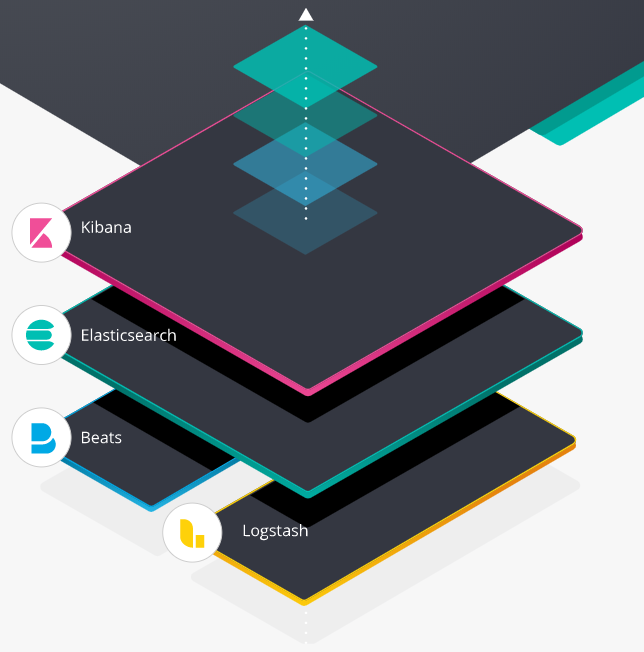Understanding Elk Stack
Posted By : Himani Mishra | 27-Nov-2020
Elk Stack
The ELK stack is an acronym used to describe a powerful collection of three open-source tools that is Elasticsearch, Logstash, and Kibana. It allows the users to take to data from any source, in any format, and to search, analyze, and visualize that data in real-time. This means it helps by providing users with a powerful platform that collects and processes data from multiple data sources, stores that data in one centralized data store that can help to scale as data grows, and provides a set of tools to analyze the data.
ELK(Elasticsearch, Logstash, and Kibana) is a log management platform that works by enabling you to gather massive amounts of log data from anywhere across your infrastructure into a single place, then search, analyze and visualize it in real-time. These logs are generated from different systems and among the most common ELK use cases and we can troubleshooting, web analytics, risk management, business intelligence, compliance, fraud detection, and security analysis. The subsequent addition of Beats turned the stack into a four-legged tool and led to a renaming of the stack as the Elastic Stack and these all four are independent tools that were designed to complete each other into an end-to-end log analysis solution that is described below.

Elasticsearch:
It is an open-source search and analytics engine for all types of data like textual, numerical, structured, unstructured, and many more. It is based on the Lucene search engine, and it is built with RESTful APIS. It offers advanced queries to perform detailed analysis and stores all the data centrally and it is helpful for executing a quick search of the documents. It is also known as the NoSQL database and it also allows us to store, search, and analyze a big volume of data.
Also Read: An Introduction To Ansible For Beginners
Logstash:
It is a light-weight, open-source tool for collecting, parsing, and storing logs for future use and it is also the data collection pipeline tool that collects data inputs and feeds into Elasticsearch. It gathers all types of data from different sources and makes it available for further use that an amazing feature. It can uniform data from disparate sources and normalize the data into our desired or preferred destinations. It allows us to cleanse and democratize all our data for analytics and visualization of use cases.
Kibana:
It is an open-source front-end application or software that is on the top of the Elastic Stack, providing search and data visualization capabilities for data indexed in Elasticsearch which completes the ELK stack. It is also called the charting tool for the Elastic Stack and it acts as the user interface for troubleshooting, monitoring, managing, and securing an Elastic Stack cluster and also the centralized hub for built-in solutions developed on the Elastic Stack. It also helps you to perform advanced data analysis and visualize your data in a variety of tables, charts, and maps.
Also Read: Setting Up Kibana For ElasticSearch
Beats:
It is lightweight and purpose-built agents that acquire data and then feed it to Elasticsearch. It is the libbeat framework that makes it easy to create and customized beats for any kinds of data that we want to send to Elasticsearch and the advantage of its flexibility, the number of Beats available, and the capabilities of Beats overall are rapidly expanding and also who have been using Elasticsearch for some time are finding that it is the challenging to keep up with what Beats can offer them.
Conclusion
ELK stack is useful to resolve issues related to a centralized logging system and its centralized logging can be useful when attempting to identify problems with servers or applications. It works best when logs from various Apps of an enterprise converge into a single ELK instance. It provides insights for this single instance and also eliminates the need to log into a hundred different log data sources.
We are seasoned DevOps solutions and service providers with vast experience in providing full-scale DevOps solutions for varied business requirements. Our team of DevOps professionals formulates effective strategies to strengthen your enterprise IT infrastructure and enhance operational efficiency. Our 360-degree DevOps solutions and services accelerate the software development lifecycle and ensure faster delivery with continuous deployment. For project related queries, reach us out at [email protected]
Cookies are important to the proper functioning of a site. To improve your experience, we use cookies to remember log-in details and provide secure log-in, collect statistics to optimize site functionality, and deliver content tailored to your interests. Click Agree and Proceed to accept cookies and go directly to the site or click on View Cookie Settings to see detailed descriptions of the types of cookies and choose whether to accept certain cookies while on the site.










About Author
Himani Mishra
She is a backend developer with good knowledge of various technologies. She is always willing to learn new technologies and is a good learner.